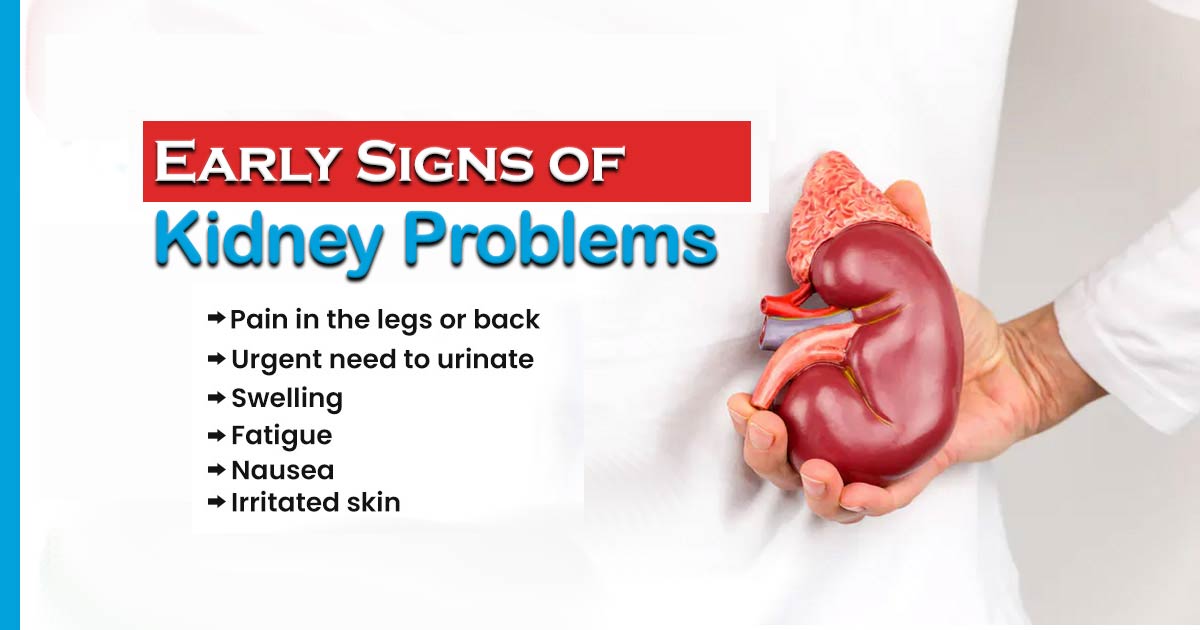Kidney Problems. Do you ever wonder how vital your kidneys are to your overall health? These bean-shaped organs, nestled on either side of your spine, may not be as noticeable as your heart or lungs, but their role is just as critical. In this article, we delve deep into the world of kidney problems, uncovering their importance and the potential issues they can pose. Are you ready to explore the intricacies of kidney health?
In a nutshell, kidney problems can have a profound impact on your well-being. These organs, responsible for filtering waste from your blood and regulating essential substances, play a pivotal role in maintaining balance within your body. In this article, we will delve into the ten key signs that might indicate your kidneys are not functioning as they should.
The Purpose of Kidneys
Before we explore the signs, let’s briefly discuss the kidney’s purpose. The kidneys have multiple essential functions, some of which are:
1. Waste and Toxin Filtration : One of their primary functions is to filter waste and toxins from the blood, ensuring that our body remains free from harmful substances.
2. Fluid Regulation : They regulate the amount of fluid in our body by adjusting urine production, effectively managing our body’s hydration.
3. Hormone Secretion : The kidneys secrete hormones like erythropoietin, which stimulates red blood cell production, contributing to overall blood health.
4. Vitamin D Activation : Kidneys play a vital role in converting inactive vitamin D into its active form, crucial for bone health.
5. Acid-Base Balance : They also help regulate the body’s acid-base balance, ensuring our blood remains at the right pH level.
Early Signs of Kidney Problems
Now, let’s explore some early indicators that your kidneys might not be functioning optimally.
Metallic Taste : One of the initial signs you might notice is a metallic taste in your mouth. This peculiar sensation can result from a buildup of waste products in your bloodstream that your kidneys are struggling to filter effectively. It’s essential to pay attention to such changes in taste perception.
Itchiness and Ammonia Breath : Body itching is another early sign. This itching is due to the accumulation of toxins in your body. Normally, ammonia is converted to urea in the liver and excreted through urine. However, in individuals with chronic kidney disease, urea can break down into ammonia, leading to ammonia-scented breath.
Later Signs of Kidney Issues
As kidney problems progress, you might experience more pronounced signs.
Edema – Swelling in the Legs
Edema, or swelling, is often seen in the lower extremities. Pressing your finger into the swollen area may leave an indentation, a phenomenon known as pitting edema. Kidney filtration impairment can lead to water retention, causing fluid to accumulate in areas like the ankles, legs, and feet.
High Blood Pressure
Kidneys play a crucial role in regulating fluid balance and filtering waste products. When kidney function declines due to disease, they may retain excess fluid and sodium, leading to elevated blood pressure. This is why high blood pressure can often be a sign of kidney problems.
Stiff Arteries
Chronic kidney disease can make arteries stiff and less flexible. This stiffness increases resistance to blood flow, contributing to higher blood pressure levels. Kidney disease can also disrupt the hormonal balance responsible for blood pressure regulation.
Tiredness and Fatigue
Feeling consistently exhausted can be a consequence of kidney disease. Accumulation of toxins and impurities in the blood can lead to weakness and difficulty concentrating. Additionally, kidneys produce erythropoietin, a hormone that stimulates red blood cell production. In kidney disease, erythropoietin levels may decrease, resulting in anemia and further contributing to tiredness.
Protein Leakage in Urine
Damaged filtration units in the kidneys can lead to protein leakage in the urine. In mild cases, you may not notice any symptoms. However, in severe cases, you might experience foamy or bubbly urine, swelling in your hands, feet, belly, or face, increased urination frequency, and muscle cramps at night.
Uremic Frost
Uremic frost, though rare, is a striking skin condition associated with severe kidney disease. It’s characterized by a white crystalline material on the skin, resulting from high levels of urea in the bloodstream. This condition demands urgent medical attention and often requires dialysis.
Nail Changes
Kidney disease can even affect the appearance of your nails. You might observe a white color on the upper part of one or more nails, with a normal to reddish-brown color just below the white part. Additionally, white bands may run across one or more nails.
In conclusion, if you experience any of these signs, it’s crucial to consult a healthcare professional for a proper diagnosis and treatment plan. Your kidneys are vital for a healthy and balanced life, so taking care of them should be a top priority.

